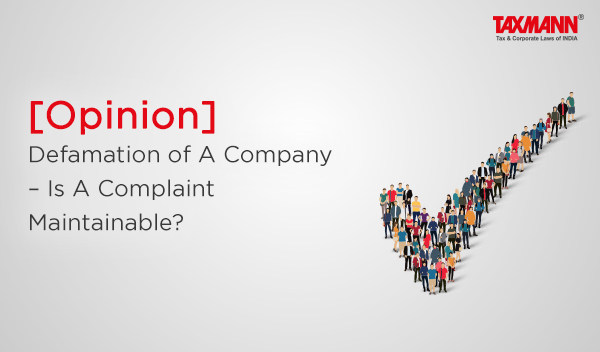[Opinion] Defamation of A Company – Is A Complaint Maintainable?
- Blog|News|Company Law|
- 3 Min Read
- By Taxmann
- |
- Last Updated on 27 November, 2023

Dr K R Chandratre – [2023] 156 taxmann.com 592 (Article)
Introduction
Of late, corporates (companies and other bodies corporate) are being subjected to derogatory, slanderous, malicious and libellous criticism by politicians (especially) targeting the political parties in power, by opposite political parties. In most of such instances, the defamatory comments and allegations are untrue or are not based any concrete evidence and are made to derive political advantage. There are other instances as well when in media (print or electronic) defamatory comments are made against companies. All this, undoubtedly, has a damaging impact on the reputation of the corporates.
A question, therefore, arises as to whether a company or other body corporate can initiate legal action of defamation against the person making such defamatory comments against the company.
A company or corporation is distinct from the shareholders who constitute it. The theory of corporate existence independent of its shareholders, and its capacity to exercise rights has been built on Saloman v. Saloman & Co case. The rights and obligations of the company are different from the rights and obligations of the shareholders. For any action taken against the company, the shareholders may be indirectly affected because their interest in the capital of the company is reduced. But an action taken against the company does not directly affect the shareholders. The company in holding its property and carrying on its business is not the agent of the shareholders. [State Trading Corporation v. Commercial Tax Officer AIR 1963 SC 1811].
A question that often arises in this regard is whether a company can initiate a civil and/or criminal legal action for its defamation?
Meaning of defamation, libel and slandour
Defamation is the act of defaming; false or unjustified injury of the good reputation of another, as by slander or libel; the publication of a statement about a person that tends to lower his reputation in the opinion of right-thinking members of the community or to make them shun or avoid him. Defamation is usually in words, but pictures, gestures, and other acts can be defamatory.
Libel is a defamatory statement made in permanent form, such as writing, pictures, or film Radio and television broadcasts for general reception and public performance of plays are treated as being made in permanent form for the purposes of the law of defamation. A libel is actionable in tort without proof that its publication has caused special damage (actual financial or material loss) to the person defamed. Libel can also be a crime (criminal libel). Proof of publication of the statement to third parties is not necessary in criminal libel and truth is a defence only if the statement was published for the public benefit.
The tort of libel has long been recognised as actionable per se. Thus, where a personal plaintiff proves publication of a false statement damaging to his reputation without lawful justification, he need not plead or prove special damage in order to succeed. Proof of injury to his reputation is enough.
Slander is a defamatory statement made by such means as spoken words or gestures, i.e. not in permanent form. Generally, a slander is only actionable on proof that its publication has caused special damage (actual financial or material loss), not merely loss of reputation. Proof of special damage is not necessary when the slander implies the commission of a criminal offence punishable by imprisonment, infection with a contagious disease, or unchastity in a woman or is calculated to disparage a person in his office, business, trade, or profession.
Click Here To Read The Full Article
Disclaimer: The content/information published on the website is only for general information of the user and shall not be construed as legal advice. While the Taxmann has exercised reasonable efforts to ensure the veracity of information/content published, Taxmann shall be under no liability in any manner whatsoever for incorrect information, if any.

Taxmann Publications has a dedicated in-house Research & Editorial Team. This team consists of a team of Chartered Accountants, Company Secretaries, and Lawyers. This team works under the guidance and supervision of editor-in-chief Mr Rakesh Bhargava.
The Research and Editorial Team is responsible for developing reliable and accurate content for the readers. The team follows the six-sigma approach to achieve the benchmark of zero error in its publications and research platforms. The team ensures that the following publication guidelines are thoroughly followed while developing the content:
- The statutory material is obtained only from the authorized and reliable sources
- All the latest developments in the judicial and legislative fields are covered
- Prepare the analytical write-ups on current, controversial, and important issues to help the readers to understand the concept and its implications
- Every content published by Taxmann is complete, accurate and lucid
- All evidence-based statements are supported with proper reference to Section, Circular No., Notification No. or citations
- The golden rules of grammar, style and consistency are thoroughly followed
- Font and size that’s easy to read and remain consistent across all imprint and digital publications are applied



 CA | CS | CMA
CA | CS | CMA
